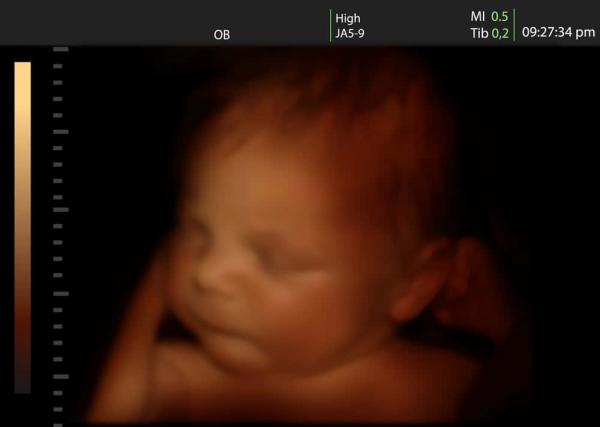
You know those deep belly laughs? The ones that heal your soul and bring tears of happiness to your eyes? It turns out those aren't just wonderful moments for you - they are beautiful for your unborn baby as well.
By six months, your embryo is affected by your emotions, according to research from the Association for Psychological Science. The effects are so powerful that your emotional health can start to form your baby's attitudes about life.
What you eat, how you manage stress, deal with depression, take care of your body - all these things effect that tiny baby in your womb. This is laughing affects your baby:
It's like a roller coaster
Physically, a baby moves up and down when the mother laughs.
"When we're watching the fetus on ultrasound and the mother starts to laugh, we can see the fetus, floating upside down in the womb, bounce up and down on its head, bum-bum-bum, like it's bouncing on a trampoline," said Janet DiPietro, the Vice Dean for research and faculty at John Hopkins. "When mothers watch this on the screen, they laugh harder, and the fetus goes up and down even faster. We've wondered whether this is why people grow up liking roller coasters."
Dr. DiPietro has done a lot of research on fetuses. Twelve weeks before your baby is born, he or she is already behaving like a newborn. This means that your laughing affects his or her emotions as well as movement.
Your mood is transferred (in a way) to your baby
Long-term anxieties, stresses or depression change your unborn baby. Mommies who are highly anxious during pregnancy have a higher chance of having anxious, colicky babies. Babies born to depressed moms are 1.5 times more likely to have depression at 18-years-old and have more emotional problems like aggression.
This is because your hormones can pass into your placenta to your baby.
Obviously, anxiety and depression are hard to control, so try doing something to lighten those hormones: like deep laughter. Laughter not only makes you temporarily happier, it changes your body as well, according to Mayo Health Clinic.
Laughing makes happier because you breath in more oxygen, which increases the endorphins released to your brain. It also helps you relax by releasing muscle tension and stimulating circulation. The long-term effects range from an improved immune system, pain relief and increased personal satisfaction - all things that affect your baby.
Your baby is memorizing your laugh
Just like you are already getting to know your unborn baby, he or she is getting to know you. Think about how much personality you can already pick up on by how active they are. Your baby is picking up on your personality as well.
Research shows that your baby's heart rate slows when you speak. Your voice, your laughter, your singing and your crying are familiar to your baby. He or she recognizes it, and it's calming.
For days when you can't laugh
We all have bad days. Don't let this worry you. Occasional stress or bad days won't have any lasting effects on your baby. Take a long bath, breathe deep, learn yoga or enjoy a day of pampering yourself. But as often as possible, let your baby feel the delightful sensation of your laughter.

